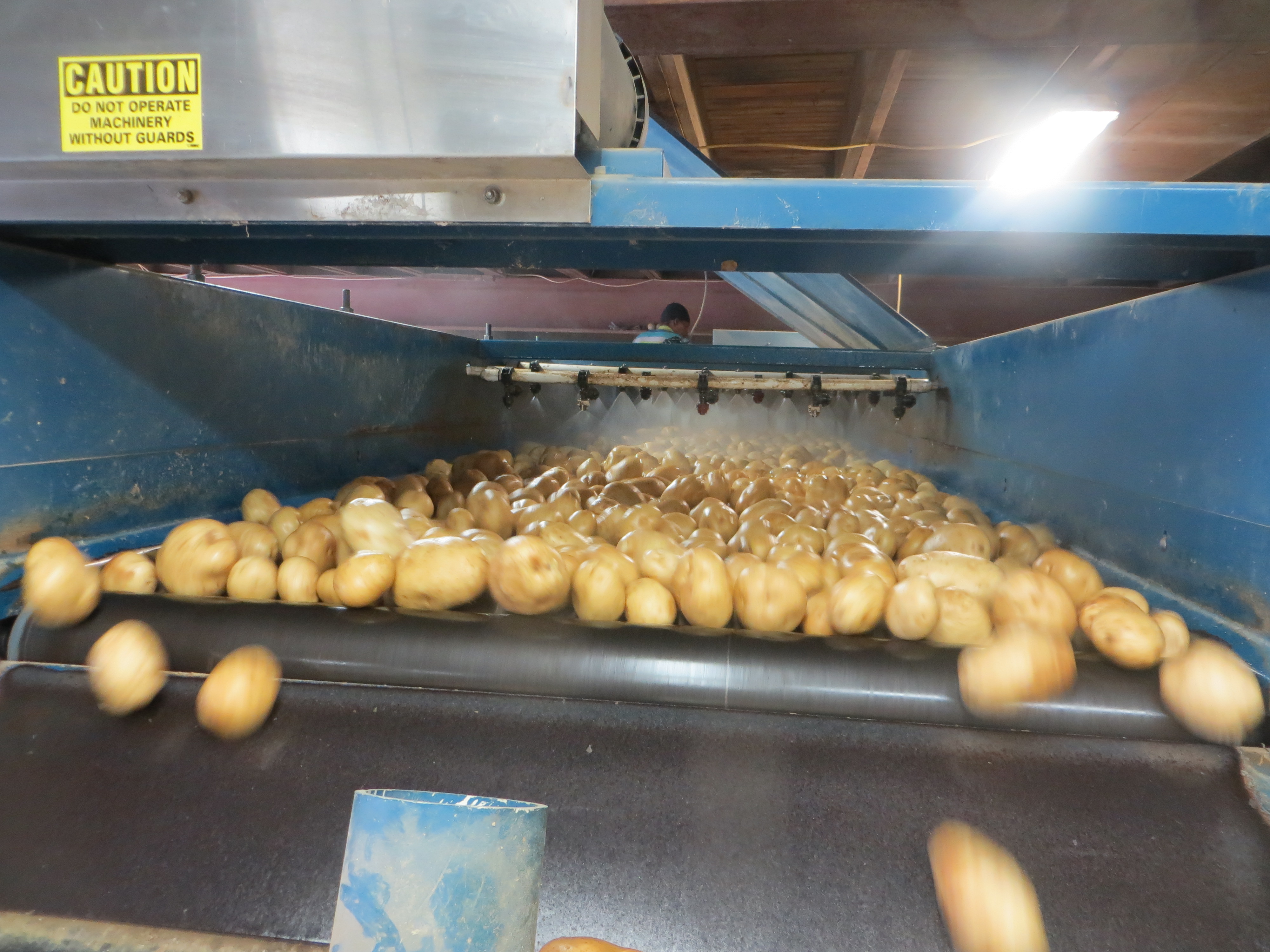
It is a rainy day on a Bridgehampton farm, the smell of dirt thick in the air as machinery rattles loudly. It is harvest season, and for the third-generation farmers at Remi Wesnofske Farms, that means one thing: potatoes. Harvesting one semi-trailer load of 120,000 potatoes is a process that takes the Wesnofskes three hours, from field to bag. From August 10 through Thanksgiving, their farm gathers two to three loads, or anywhere from 240,000 to 360,000 potatoes, per day.
That is a lot of fries.
“I’ve never met a person who doesn’t like potatoes,” said John Wesnofske, whose potato farm is one of only a handful still operating on the East End.
“Years ago, there must have been 50 potato farmers,” Mr. Wesnofske said.
The soil on the South Fork is good for potatoes, as it is drains well yet holds moisture, which means there is less need to irrigate. Many of the former potato farms in Bridgehampton, where the industry was most intense on the East End, have transitioned into specialty vegetable farms or horse farms, or they have been shuttered. Although the Wesnofskes will not rule out growing other vegetables, which local farmers almost exclusively sell for retail distribution, they are happy to be potato wholesalers.
Hailing from Crescent City, Florida, Eddie McKnight is one of Mr. Wesnofske’s employees. Although mostly retired, he still works one season grading potatoes each year, and he has been heading north to Bridgehampton since 1995. He says that despite the increased mechanization of farming, the process of grading potatoes—or choosing the ones fit for consumption—hasn’t changed that much.
“It is Monday through Friday, we don’t deal with the public,” said Mr. Wesnofske of running a wholesale operation. Although vegetable or fruit growers usually have a higher markup on their produce, “you can brag about your prices, but you can’t make up the volume,” Mr. Wesnofske said.
Sold mostly through the multi-million-dollar produce distributor Hapco Farms, most of Mr. Wesnofske’s potatoes end up in grocery stores on the Eastern Seaboard, like Shaw's.
“We only harvest for three months of the year; the chain store supplier wants year-round potatoes,” Mr. Wesnofkse explained. “They don’t go directly to the farmers [to buy] anymore.”
Some stores like Citarella, or local restaurants like the Hampton Maid, buy directly from the Wesnofskes, but otherwise most of their potatoes are sold through wholesale distributors.
“If it weren’t for Andy Pollak, I don’t know if other buyers would be buying from us,” Mr. Wesnofske said, referring to the owner of Hapco Farms. Founded over 50 years ago by Henry Pollak, the company grew to become the largest vegetable packing company on the East Coast. Mr. Pollak, a local to the East End, runs the company, and in the early 2000s encouraged Mr. Wesnofske to begin bagging his own potatoes in order to garner more profit. “He’s been keeping the potato industry from ending,” Mr. Wesnofske said of Andy Pollak.
Mr. Wesnofske scoffs at the mention of Idaho potatoes, saying that marketing has more to do with their appeal than their taste does.
“Everyone thinks that they are all-purpose,” he said, noting that Idaho potatoes are typically russets, which have been widely used for fast food restaurant fries.
Mr. Wesnofske grows many types of potatoes, from all-purpose white potatoes like the Irish potato to yellow ones like the Yukon Gold. The Bridgehampton farmer’s favorite spud? Vivaldi. Those yellow taters are a European variety and fairly moist.
In addition to owning 270 acres of land, he and his family rent about 150 acres. Much of that is leased from local landowners who, thanks to New York Agricultural Districts Law, receive reduced property taxes in exchange for letting their land be used for agriculture.
“We try to tell landowners” about the program, said Mr. Wesnofske. He acknowledged that over time his family has been farming less land, losing many of the rented fields—from 700 acres in the 1970s to the less than 400 that they farm today.
As other farmers went out of business, Remi Wesnofske, Mr. Wesnofske's grandfather, was able to buy or rent more land, Mr. Wesnofske said. His grandfather was also one of the first farmers to place an easement on his land and now, Southampton Town and Suffolk County own the development rights on nearly all of their farm.
‘That is why we are still farming,” Mr. Wesnofske said. “He was able to pass it on to the next generation at a reasonable price, our father was able to pass it on at a reasonable price—hopefully we can do that for our kids.”